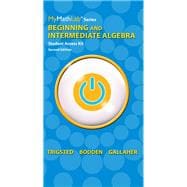NOTE: Before purchasing, check with your instructor to ensure you select the correct ISBN. Several versions of Pearson's MyLab & Mastering products exist for each title, and registrations are not transferable. To register for and use Pearson's MyLab & Mastering products, you may also need a Course ID, which your instructor will provide.
Used books, rentals, and purchases made outside of Pearson
If purchasing or renting from companies other than Pearson, the access codes for Pearson's MyLab & Mastering products may not be included, may be incorrect, or may be previously redeemed. Check with the seller before completing your purchase.
Kirk Trigsted, Kevin Bodden, and Randy Gallaher revolutionized developmental math when they created Beginning and Intermediate Algebra, a completely clickable eText written from the ground up within MyMathLab®. Recognizing that today’s students have a tendency to jump straight to the homework instead of reading the text, Kirk Trigsted created an online learning environment that is a seamless mix of exposition, videos, interactive animations, tutorials, and assessment. This approach leverages the power of MyMathLab and leads students to interact with course materials and learn in a new way, which is proving to be more effective.
This package contains the Access Kit for MyMathLab plus the Guided Notebook
0321990935 / 9780321990938 MyMathLab for Trigsted/Bodden/Gallaher Beginning & Intermediate Algebra -- Access Card -- PLUS Guided Notebook
Package consists of:
0321990129 / 9780321990129 MyMathLab eCourse for Trigsted/Bodden/Gallaher Beginning & Intermediate Algebra -- Access Card
0321990706 / 9780321990709 Guided Notebook for MyMathLab Trigsted/Bodden/Gallaher Beginning & Intermediate Algebra








